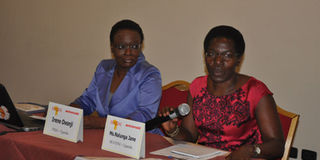Avoid Western tax models - experts

Action Aid International chairperson Irene Ovonji Odida (L), and SEATINI country director Jane Nalunga discuss the impact of illicit inflows on Uganda and the regional economies in Entebbe recently. SEATINI and Action Aid want the government to formulate its own tax model that reflects its interests. FILE PHOTO
What you need to know:
According to experts from Southern and Eastern Africa Trade Information and Negotiation Institute (SEATINI) and Action Aid, Uganda must avoid Double Taxation Treaties (DTT) that are crafted by developed nations because they largely reflect their interests and gives little or no concession to the other party.
Kampala.
Uganda should formulate treaties that not only protect her interests as a country, but also help her collect more revenues from the multinational companies who have tendencies to avoid paying taxes, experts on trade treaties have advised.
According to experts from Southern and Eastern Africa Trade Information and Negotiation Institute (SEATINI) and Action Aid, Uganda must avoid Double Taxation Treaties (DTT) that are crafted by developed nations because they largely reflect their interests and gives little or no concession to the other party.
Double Taxation Treaties are conventions between two countries that aim to eliminate the double taxation of income or gains arising in one territory and paid to residents of another territory.
They work by dividing the tax rights each country claims by its domestic laws over the same income and gains
“Do not sign the Organisation for Economic Co-operation and Development (OECD) double taxation treaty model because is not ideal for Uganda you rather sign the United Nation model or a better one,” SEATINI Tax Justice Adviser Anders Reimers Larsen said last week at a tax policy breakfast meeting in Kampala.
In a sideline interview, he told Daily Monitor that Uganda can also adapt the EAC model, for it will ensure that money made in Uganda is taxed here, but only if the template used is not copied from OECD which safeguards the interests of most developed countries such as the US and UK, among other western nations.
In his presentation, Mr Martin Hearson, an analyst from the London School of Economics, said: “DTT are about who gets to levy which tax. Some give more or less but it all comes to a political negotiation.”
He continued: “The OECD model is about removing obstacles that makes investment difficult in developing countries. It increases investment between two countries and blocks others from doing so—for example you have so much investment from country X and you cannot have the same with country Y.” Mr Hearson also said the United National model is not any better given that the majority of the experts who crafted it were from the Western countries.
At the same meeting, Finance minister Maria Kiwanuka, said: “Uganda will develop a her own DTT, something that is already being done by the ministry’s technical team.
why government suspended negotiations on double taxation agreements
Mid this year, the government suspended negotiations on Double Taxation Agreements after it emerged that the country’s interests and priorities contained in most of those treaties are not usually clearly stated.
According to the Commissioner for tax policy at the Ministry of Finance, Mr Moses Kaggwa, the suspension comes from the need to have clearer guidelines in terms of how the country can benefit.
“We have stopped negotiations of any new agreement until we have a policy in place that will not only offer guidelines but give clear priorities of what our interests and objectives are,” Mr Kaggwa told participants who attended a two-day East African regional workshop organised by SEATINI and Action Aid in Entebbe.
He continued: “We are working on policy outcomes that will be good for the country. We are trying to avoid a situation where we enter into an agreement without clear position.”
negative treaties
The Chairperson of Action Aid International board, Ms Irene Ovonji, describes treaties that allow multinational companies to repatriate all the profits it makes in a country as unfavourable while the chief executive officer of SETINI, Amb Nathan Irumba said Western countries know what they want and all they do, including the treaties they sign are geared towards achieving their objectives.




